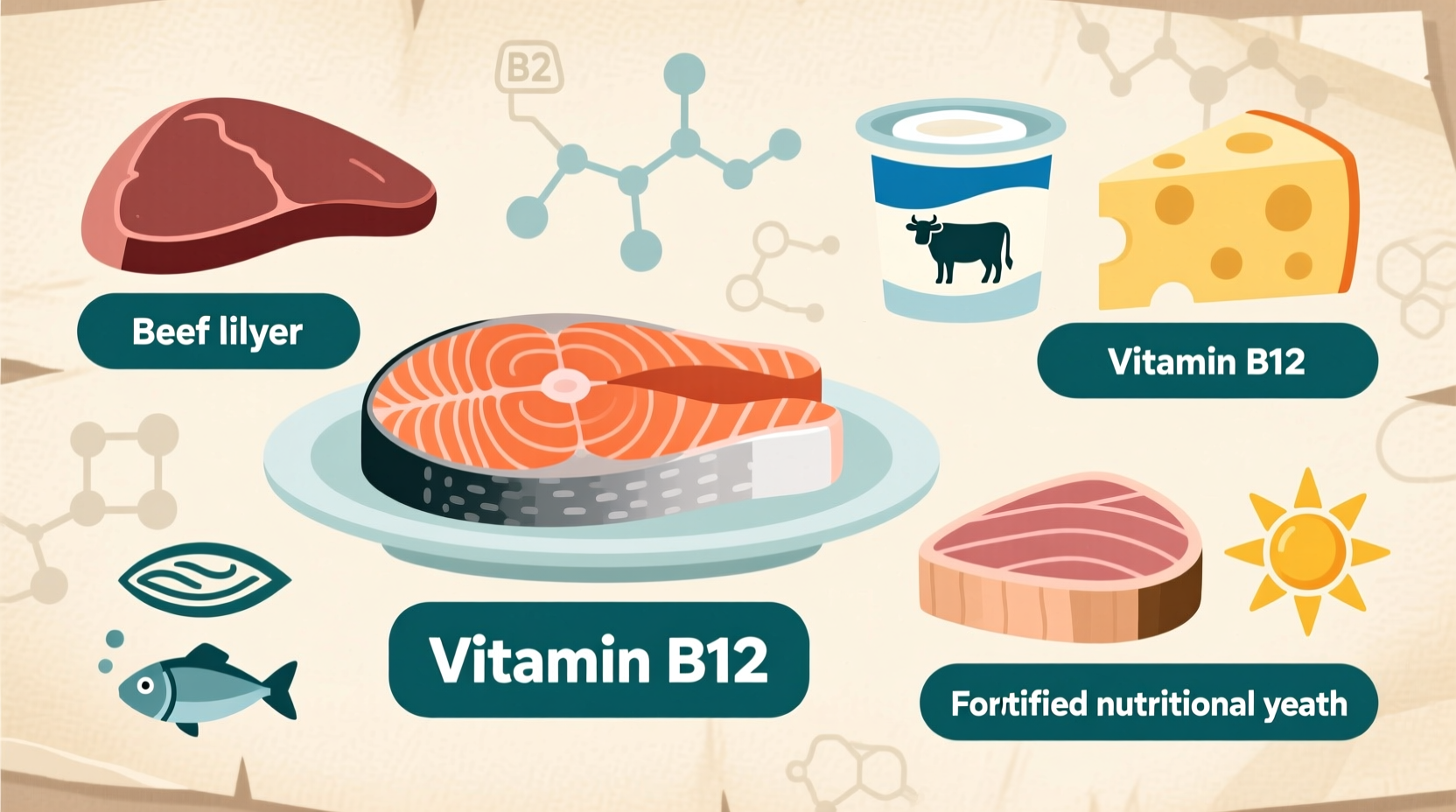Discover the most potent natural sources of vitamin B12 to optimize your health and prevent deficiency. This comprehensive guide delivers science-backed information about which foods deliver the highest concentrations of this essential nutrient, how much you actually need, and practical ways to incorporate these foods into your daily diet.
Why Vitamin B12 Matters for Your Health
Vitamin B12, also known as cobalamin, plays a critical role in your body's fundamental processes. This water-soluble vitamin supports red blood cell formation, neurological function, and DNA synthesis. Unlike other vitamins, your body can't produce B12 on its own—you must obtain it through dietary sources or supplementation.
According to the National Institutes of Health, adults need 2.4 micrograms (mcg) of vitamin B12 daily. Pregnant women require 2.6 mcg, while breastfeeding women need 2.8 mcg. The challenge? B12 absorption decreases with age, and certain medical conditions can impair your body's ability to absorb this crucial nutrient from food sources.
Top Natural Food Sources of Vitamin B12
When evaluating which foods are rich in B12, it's essential to understand that animal-based products contain the highest concentrations of naturally occurring B12. Plant-based foods generally don't contain significant amounts unless fortified.
Animal-Based Powerhouses
Organ meats represent the most concentrated natural source of vitamin B12. Just 3 ounces of cooked beef liver delivers a staggering 70.7 mcg—nearly 3,000% of your daily requirement. While liver might not be everyone's favorite, incorporating it occasionally can significantly boost your B12 levels.
Seafood offers excellent B12 options for those who prefer milder flavors. Clams lead the pack with 84 mcg per 3-ounce serving, followed by cooked salmon (4.9 mcg), rainbow trout (3.5 mcg), and tuna (2.5 mcg). These fish also provide omega-3 fatty acids, creating a powerful nutritional combination.
For everyday convenience, consider these reliable B12 sources:
- Beef (1.5 mcg per 3 ounces)
- Plain Greek yogurt (1.3 mcg per cup)
- Milk (1.2 mcg per cup)
- Eggs (0.6 mcg per large egg)
| Food Source | B12 Content (per 3 oz) | % Daily Value |
|---|---|---|
| Clams | 84.0 mcg | 3,500% |
| Beef Liver | 70.7 mcg | 2,945% |
| Salmon | 4.9 mcg | 205% |
| Rainbow Trout | 3.5 mcg | 145% |
| Tuna | 2.5 mcg | 105% |
| Beef | 1.5 mcg | 63% |
Special Considerations for Different Dietary Patterns
Your dietary choices significantly impact your ability to obtain sufficient B12 from food sources alone. Understanding these context boundaries helps you make informed decisions:
For Vegetarians
Dairy products and eggs provide moderate amounts of B12, but vegetarians should monitor their intake carefully. One cup of plain yogurt delivers about 1.1 mcg (46% DV), while two large eggs provide approximately 1.2 mcg (50% DV). Combining these throughout the day helps meet requirements, but some vegetarians may still benefit from fortified foods or supplements.
For Vegans
Natural plant-based foods contain negligible B12, making fortified options essential. Look for:
- Fortified plant milks (almond, soy, oat)
- Fortified nutritional yeast (2 tablespoons can provide 8 mcg)
- Fortified breakfast cereals
- B12 supplements (methylcobalamin form preferred)
The Academy of Nutrition and Dietetics confirms that well-planned vegan diets can meet nutritional needs, but emphasizes that "supplementation with vitamin B12 is essential" for this population. Without consistent fortified food intake or supplementation, vegans face significant risk of deficiency over time.
Practical Strategies for Maximizing B12 Intake
Knowing which foods are rich in B12 is only half the battle—you need practical ways to incorporate them into your daily routine:
Meal Planning Tips
- Start your day with fortified cereal (providing 100% DV) paired with fortified plant milk
- Add canned salmon to salads or make salmon patties for lunch
- Include Greek yogurt in smoothies or as a base for dips
- Try a weekly liver dish if you're open to organ meats
- Use nutritional yeast as a cheese substitute in vegan recipes
Cooking Considerations
Vitamin B12 is relatively stable during cooking, but certain preparation methods preserve more nutrients. Steaming or baking fish retains more B12 than frying. When using fortified products, check labels to ensure they haven't expired, as B12 can degrade over time in fortified foods.

When Food Sources Aren't Enough
Certain populations face challenges absorbing B12 from food sources, even with adequate intake:
- Adults over 50 often develop atrophic gastritis, reducing stomach acid needed for B12 absorption
- Individuals with pernicious anemia lack intrinsic factor necessary for B12 absorption
- Those who've had gastrointestinal surgery may have reduced absorption capacity
- Long-term users of acid-reducing medications (PPIs)
If you experience symptoms like fatigue, weakness, constipation, loss of appetite, or neurological changes, consult your healthcare provider. Blood tests can determine your B12 status, and your provider may recommend supplements even if you consume B12-rich foods.
Key Takeaways for Optimizing Your B12 Intake
Building a diet rich in vitamin B12 requires understanding both the most potent food sources and your personal nutritional needs. Prioritize animal-based foods if you eat them, incorporate fortified options if following plant-based diets, and consider supplementation when necessary. Regular monitoring of your B12 status through blood work provides valuable insight into whether your dietary approach is sufficient.











 浙公网安备
33010002000092号
浙公网安备
33010002000092号 浙B2-20120091-4
浙B2-20120091-4